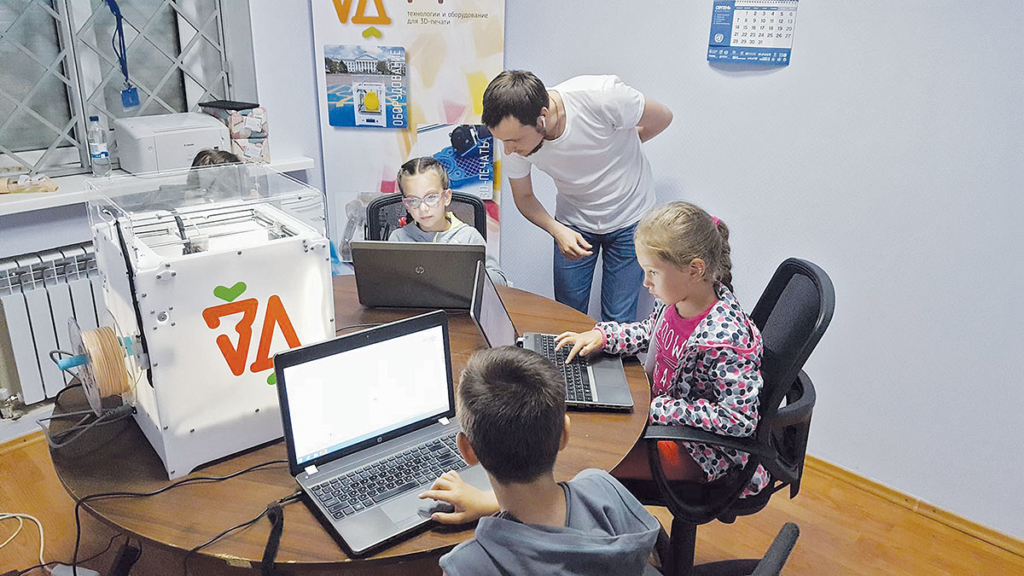KRAMATORSK, Ukraine — Before Russia’s war stormed into Kramatorsk in Donetsk Oblast in 2014, Sergiy Gakov was teaching engineering at a local university. Three years later, he manages one of the few IT hubs in Donbas that teaches programming and holds IT events and lectures.
For Kramatorsk, an industrial city that has for decades been relying on three machinery plants to provide workplaces, modern IT education gives the city’s youth a chance for the better future.
A city of around 160,000 people, Kramatorsk is located some 80 kilometers from the front lines of Russia’s war on Ukraine in the Donbas. Now the administrative center of Donetsk Oblast, Kramatorsk was one of the first cities occupied by the Russian-led separatists in April, 2014. It was liberated by Ukrainian army three months later.
The business partner of 36-year-old Gakov, Nikita Yeryomin, 35, says that it’s easy for many to successfully change their job from a machinery factory to IT due to their technical background.
“If many people in Kramatorsk worked in IT, they would become a sort of a fishing rod that helps to catch fish; they would attract more money to the city and increase the overall well-being.”
Their IT hub, called Geek Bunker, was launched in 2016 thanks to the funding from private investors, including the Kramatorsk-based outsource company Quart-Soft Ukraine, which now plans to expand the hub and add a co-working space.
“In other cities there are various conferences and meetups where people can communicate with each other and learn something new. In Kramatorsk, there is also an IT conference once a year, but it’s not enough,” said Yeryomin.
Geek Bunker offers various lectures by Kramatorsk IT experts, free programming classes, and has a small laboratory with a 3D printer.
“Kramatorsk was basically a working town that emerged from two technical startups,” Gakov joked, referring to the machinery factories that were built in Kramatorsk in the 19th century.
“But the war gave the city a huge push,” Yeryomin said. “Now, the focus slowly moves from big industrial manufacturing to small businesses and startups.”
Popularizing IT
The big and light-filled room of Geek Bunker with a paper screen for presentations is a hidden gem amid Soviet-style buildings and signboards offering cheap vacation in annexed Crimea peninsula.
Yeryomin and Gakov said that the industrial Kramatorsk follows the all-Ukrainian trend with more and more people wanting to become involved in IT because of the high salaries.
For those, Yeryomin and Gakov, together with the Kyiv-based non-profit organization Brain Basket, held a five-month course of coding called #CS50 in Kramatorsk.

Children learn the basics of 3D modeling in Geek Bunker in Kramatorsk, a city in Donetsk Oblast. (GeekBunkerUA/Facebook)
By the end of the course, the participants produced three projects — an information system that helps to track public transport, an online service for arranging doctor appointments, and an online calendar of cultural events.
In summer, Yeryomin and Gakov taught kids programming during the summer camp IT For Kids, which was organized by another Kramatorsk non-profit organization Free Ua. Gakov is also giving lectures in schools about jobs that will be popular in the future to promote coding among kids.
Now they are choosing participants for the second run of #CS50 course and hold another course for kids, Learn Programming by Playing.
Yeryomin, who is also a teacher in the local Donbas State Engineering Academy, said that the main visitors of IT courses are teens and 30-year-olds who want to switch to IT from other jobs. Many of those who decide to change their career have a profound technical education, because the city is known for its factories producing heavy machinery and jewelry.
At the same time, many young talented people still leave Kramatorsk to pursue job opportunities in other big cities.
Fast technology train
Apart from teaching others, software programmer Yeryomin and engineer Gakov are also collaborating on their other startup — a cloud technology that allows working with various equipment remotely.
So far, they use a cloud technology to remotely work with 3D printers made by Gakov and another Kramatorsk entrepreneur Bohdan Trystan.
Gakov and Yeryomin want to cooperate with factories in Kramatorsk to use a cloud technology for remote control there, however, so far managers at the factories have been “treating it like a fiction story,” according to Gakov.
Gakov is also working in a startup that is producing inexpensive prosthesis for amputees, the parts of which are mostly printed by a 3D printer. The cost of such prosthesis varies from $100 to $700, according to Gakov. He said that the company didn’t find much interest for the prosthesis in Ukraine, but plans to export them to East Asia.
This September, Gakov and Yeryomin presented their printer that supports cloud technology in Kyiv during the Skhid-Ekspo (East-Expo) exhibition of successful entrepreneurs from Donbas.
Both believe that their inventions reflect latest trends in technology.
“Ukraine usually invests in a train that has already left. Everyone wants to climb into this moving train, but it’s not possible anymore,” Gakov said. “I believe in the future of our project, because I think that it’s a train that hasn’t yet left the platform.”
